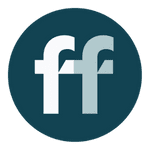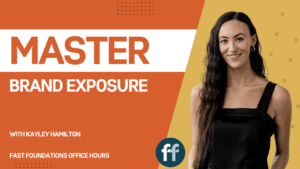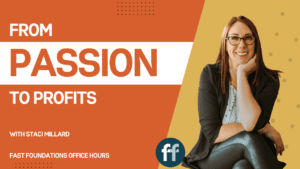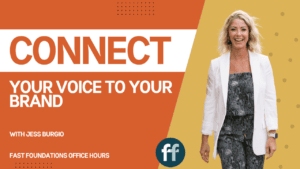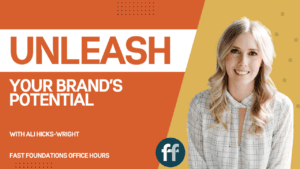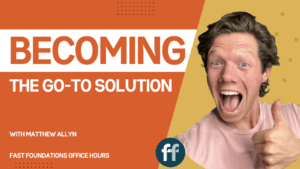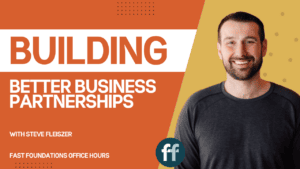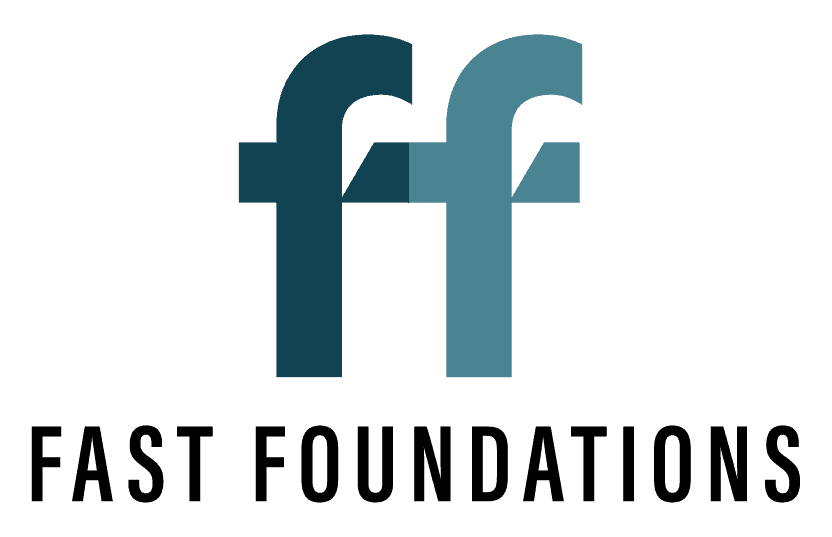The Power of PR and How To Get More of It with Nicole Myden
Show Notes
Want to know how to get more eyes and ears on your business? We’re back with another mentor session and this one is full of tips to help you get more press!
Nicole Myden is a public relations (aka PR) expert and she is sharing some tips you can implement immediately to pitch yourself and grow awareness around the impact you are making!
It all starts with you as a human and the relationships you get to create and nurture! Nicole is famously known for saying everyone is deserving of press!
What tip are you going to implement to make more connections and put your business and impact out in the world for others to benefit from?
In this Episode, we talk about
- How to pitch yourself and get MORE PRESS!
Listen Now
The Quickest Way to Grow Your Early-Stage Business
The Fast Foundations Community is a network of entrepreneurs who want to grow together!
Whether you are about to make the jump from corporate to launch something new, working on side hustles and want to take those full-time, just starting out on your entrepreneurial journey, or struggling to scale, we are here to support you & don’t want you to continue on alone.
NICOLE MYDEN (00:00):
Why would I feature you versus this person? Because you’re responding to me in a timely manner because you’re giving me great content, because you’re organized. You have all the right photos, you have all the right materials, you’re making my job easy. If you were to ask 10 journalists like what they want in pitches or what they need from pr people always, always, you will see this consistently. It is always about how do we become a trusted resource and make their jobs easier?
JESSICA BURGIO (00:34):
What is keeping you from growing your business to the next level? I’m Jess Burgio, one of the hosts here for Fast Foundations, the podcast. Between the three of us, my co-host Jim, RT
(00:42):
, and I have grown several businesses scaling Beyond Seven Figures. And you know what? Not a single one of those businesses came with a blueprint for years. We poured time and resources into our businesses, from salons, tech companies, and product-based businesses navigating success and failures on our own. For all of us, though, it began to change in 2019 when we found a community of like-minded entrepreneurs and industry leaders to mentor us. That community was fast. Foundations just like the Mastermind, we’re bringing on experts and having discussions to give you tips to not only improve the foundational skillsets you need, but to also fast track your growth. We’ll dive into the core pillars of what will make your business succeed. Whether you have a brand new idea that you’re looking to turn into a business, or you’re already a successful entrepreneur looking to scale, this community is here to take you to the next level. Let’s dive in.
RT CUSTER (01:38):
Hello. Hello. Welcome back to the Fast Foundation’s podcast. I have a mentor here with me for another mentor session. Nicole, thank you so much for being here. You’ve been involved in Fast Foundations for a while. You’ve been in the community for a while. I’m so excited for this. I wanna hop right in. We were talking before we hit record about how entrepreneurs kind of associate their business with their identity and all the pros and really cons that come from that. So what’s your take on that?
NICOLE MYDEN (02:14):
Uh, it’s such a great question and something that I definitely wanna see people talking more openly about, hopefully moving into a next year. Um, for me personally, at 43 years old, I’ve had a onslaught of, you know, beautiful corporate jobs in my life and a 23 year career in pr, um, multiple ventures in entrepreneurship. And, you know, it does just be fully transparent. It, it took losing my father, um, unexpectedly several years ago for me to kind of take a step back and work through in my healing journey. Um, my identity tied to my career because like many people, um, work has led so much of my life. And that’s not a good or bad thing. It is just what it is. It’s just what my journey’s been. And I think losing him so suddenly and, and kind of going down that rabbit hole of years of extensive healing around what my work has meant for me and how I help people and also my identity.
(03:15):
You know, it cracked the doors open for a lot to be revealed to myself, which was that I truly believe there are, um, so many people out there who are finding their impact in the world through their work. And while I am the biggest proponent of championing anybody that has a vision that they wanna bring to life, I’ve brought multiple, I’ve birthed multiple businesses. I I’m the biggest proponent of everybody, you know, going for everything they want in their life. Um, but wanting to make sure that in all this noise of this online entrepreneurial world, that we’re not losing sight of the fact that we are impactful as our soul. Like who we are is, is what should lead and, and how we earn a living and what we do for work and how we serve people through our work is wonderful. Um, I just don’t believe that it should be our, you know, leading identifier, if you will.
RT CUSTER (04:09):
I, I love that conversation. And before we continue it, tell us more about what you do, you know, and who, who you are and what you focus on right now.
NICOLE MYDEN (04:19):
Yeah. First of all, thank you so much for having me. Um, this is definitely a full circle, kind of talking with you today. I know Chris and Lori from years ago, and there’s a whole other story that comes with that. But, um, just appreciate this, um, to help everybody, hopefully in your community as much as I can. I have been blessed to have had a career in public relations for 23 years. Um, I grew up in Los Angeles, um, found my way to Scottsdale, Arizona where I am now, uh, six years ago by a gut instinct to shift my environment and place myself into a city where nobody knew me, and literally forced myself to rebirth my <laugh> myself, my life. Um, create an entire new network, built several businesses here. And, um, you know, it, it’s wild. I, I did not intend to get into public relations.
(05:10):
I actually grew up thought thinking, especially in la I, I wanted to write for a magazine. I was so, I was such a fan of movie and entertainment and growing up in Los Angeles, all the excitement. So I thought I was gonna be a, you know, entertainment journalist or a broadcast journalist. Um, I think I was kind of swirling around the PR world, if you will, as a little girl, but through a random, I don’t know, coincidental divine opportunity in college. I actually found myself going to the Cannes Film Festival my senior year of college, um, after being a journalism major for three and a half years. And then found myself in this super exciting moment in time where the universe was like, we’re gonna introduce you to public relations. And I was assigned an internship to shadow a film publicist. Now we’re going back over 20 years.
(05:57):
I, I’m 43, so, um, this was a long time ago. It was May of 2000. And I didn’t even know what public relations was. Nobody was talking about it then. We didn’t have all this digital access that we have now. I think Facebook had just come out and we had just started using emails. So I’m dating myself, but, you know, I had the opportunity to shadow a film publicist and learn about publicity. And from that moment I graduated college and, uh, I was going to the University of Arizona. So that was my first segue to Arizona Life. And I went back to LA and I dove right into pr and for 23 years till I’d done, and I’d done it in capacities of having, you know, like I said, corporate jobs, I’d worked with huge global brands. I’ve worked at agencies, um, I have been in-house at companies, and now I’m in this phase where I’ve had several, um, ventures, if you will, as, as doing it on my own and in, uh, different kind of capacity.
(06:53):
Um, so I’ve worked with large brands, I’ve worked with small brands, um, I’ve worked with, you know, everything you can think of, every industry. I’ve touched it all. And I think now what it’s done, it’s put me in a place where I met so many amazing entrepreneurs when I first moved here, because I didn’t have a network anymore. My entire life was in la I left everything behind when I moved here. And. That was a big deal. It was a big deal to just leave all of that, that I had built behind, but I knew something greater was waiting for me here. And it didn’t click until I started throwing myself in rooms here to start meeting people. I was going to networking events. I was throwing myself out into everything I could go to. And this common question kept coming up, what do you do for work, Nicole? And of course, no one wants to know what else I do, but they wanna know what I do for work. So I would say I do public relations. And then the next question would be, okay, so how do I get on tv? How do I get in the magazines? And it started getting me thinking, wow, maybe I can take all of this experience that I’ve had, you know, in this career in la, um, and help small business owners here on the ground understand a little bit more about public relations.
RT CUSTER (08:08):
and, and what’s the, you know, you, you said, and I think that’s probably so common. Like, how do I get on tv? How do, how do I get a, a headline? Uh, that, that makes sense to me. And I, I have a fair amount of experience in PR and, and, and getting some, some headlines and some stories. But what’s the thing that you feel like you’re educating small business owners and entrepreneurs on the most around pr? Like, what’s the thing that most of us just don’t really know?
NICOLE MYDEN (08:40):
So, such a great question. So I like to talk about PR from an energetic standpoint because I think that just like anything in our business, if we’re putting our energy into understanding finances or, or business development or marketing strategies, right? Public relations requires energy and it requires our time. And so I meet a lot of people who say, you know, I want this and I wanna be featured here and I wanna do this. And what happens is you can see the people who put the energy into it who get the result, right? There’s a lot of people who say they want it, and then they don’t wanna put the extra time or carve out the time. So I actually developed this whole system around color blocking <laugh> in our schedules for actually carving out time to pitch, because it requires that, right? It requires energy and effort.
(09:36):
I wanna be super clear though, cuz I share this with people every time I teach a workshop, I am the biggest proponent of shouting from the rooftops that you do not need public relations or publicity for your business to define your worth. So you as a business owner, anybody listening as a business owner, you are worthy of press coverage, whether you have it or not, or whether you’re going to get it or not, your business, and you are impactful. Having public relations and press coverage helps to amplify. So it is a great thing, but I don’t want people listening to get in the habit of thinking, which can happen that their business is not worthy or they’re not successful because they haven’t received press coverage yet. It’s, it’s actually irrelevant because I know a ton of businesses who are killing it who’ve never been featured in the press.
(10:37):
And I also know people who are starting out right now who are getting a ton of press and it is helping them, but it doesn’t take away from the other businesses, right? So there, there’s this energy around publicity that, oh my God, I’ve gotta be featured on Forbes, I’ve gotta be featured on entrepreneur. No one’s gonna buy, buy, buy my products or buy what I’m selling or listening to me. I don’t think that’s the case. That’s my opinion. And I’ve been at this a long time. I think that everybody’s worthy of it. I see, I work with small businesses every day that get great press coverage. I think it’s just about people understanding it and how to leverage it. Because getting it is one thing, but then what do you do with it once you get it? Which is another piece of the puzzle, right?
(11:18):
We have to amplify it, we have to leverage it, we have to maximize it to take a placement or take an opportunity and leverage it energetically for the next opportunity. So there’s, there’s definitely a process to it. I think the other thing too is that people forget, which I teach a lot as well, that everyone’s looking at the national stuff. Oh my gosh, I need the credibility. I need to be featured on Entrepreneur or Forbes or I don’t have a business. Again, not the case. What I actually would love to see small business owners doing, and I teach this heavily at my workshops, is that you need to actually focus on becoming the expert in your local market, where your actual business is based. And the clients that I work with every day, what we do is we focus on nicheing them down and focusing on getting press in their regional market because there’s a ton of press for the taking where you are based in your own market, whatever city you’re in, there are magazines, there are podcasts, there are TV stations, there are online outlets.
(12:21):
There’s opportunity there to really build yourself as that expert you are and that go to in your town so that the national opportunities can then follow. And I feel like a lot of people discredit, oh, that’s just a local paper, a newspaper, it’s a local magazine, is actually really important because what we can do is take these local opportunities and turn them into bigger opportunities, right? A lot of national mass folks want to see, you know, if you, I hear all the time, Nicole, I wanna be on the Today Show. I wanna beca Born America. Well of course, who wouldn’t, right?
RT CUSTER (13:01):
I do too.
NICOLE MYDEN (13:03):
<laugh>. Yeah, and, and you deserve to. But I can tell you this, a producer from the Today Show will want to see footage of you on television in your local market before they would never book you on their show. So when you think of it that way, and think about the local market being this opportunity for us to work through, to start, you know, getting a reel together, to start building that momentum, to start showing the universe too, Hey, I’m worthy of this. I deserve this. I’m doing it. And now let’s take these local opportunities and make them bigger.
RT CUSTER (13:37):
Hey, it’s RT. Thanks so much for listening to the Fast Foundation’s podcast. I want to see you in the room. I don’t want you to just be hearing my and our voices. Let me tell you about the Fast Foundation’s Mastermind. It’s a six month long program, and it’s our signature program. It’s how you join our community. Every time we talk about this amazing community of almost 400 people that have gone through our mastermind that we have here on the podcast that we hear from, and our mentors, all that kind of stuff, all the guest speakers, coaches, all the awesome things that we get to do. It all starts with the Mastermind. It’s a six month long program with two, two day in-person events, one’s in Scottsdale, one’s in Denver. Yes, they’re in amazing, beautiful places. We have them in cool spots because that’s fun. We also give you six months with a coach one-on-one.
(14:30):
And the most important thing is once you go through that mastermind and you learn from all these amazing speakers that we bring in, learn from your coach, grow with me and Jim and the rest of our team, you get lifetime access to our community. Every single thing that we do is recorded and uploaded a private platform off of Facebook, off of the social media’s all credit crap. And it’s saved in one place that you have, again, lifetime access to. So when you join the Fast Foundations Mastermind, which you can learn more [email protected] and click on join the community to apply, when you join this mastermind, you are in our community for life. I really hope to see you in the room and I hope to talk to you soon. I love it.
(15:19):
And you, you know, you, you talked about, and you mentioned a ton of different types of press. You’ve mentioned local, national, everything in between. They say all press is good press. But like, which ones should we try to get first or focus on? Is TV better than print? You know, what, what’s, what’s a magazine versus a newspaper? What, in your opinion, if you had to kind of rank ’em all? Like, there’s so many options, like what do we do? What do you recommend?
NICOLE MYDEN (15:53):
Right. Where do we start? It’s like a maze, right? <laugh>. And I think this is why a lot of people actually struggle with public relations when it comes to their business because they can feel very overwhelming. They don’t know where to start. Which is why I simplify it by telling people and teaching them how to kind of build these local media Rolodexes in their own market where they’re based. And I think once you get into the rhythm of working with your local media, reaching out then to national folks won’t feel as intimidating. I think it’s a confidence thing. It’s like when somebody, they get, they get that hit, right? They get the placement locally, okay, great, I’m gonna be featured in my local magazine. I got this, I’m in the flow, I’m in the energy I’m receiving. Now let’s move on to extend this pitch list and, and go after some other things.
(16:40):
But I’d say, you know, I’m a traditional media girl. I’ve been doing this since, you know, for 23 years. So again, when I started none, none of these digital things existed. <laugh>, God bless them, I love a good magazine still, and I love a good newspaper and I love a good TV segment for clients. So, um, I think it depends on your product. I think it depends on your service. So some people who have C P G, right? If you’re in the c PPG space, you really wanna show your product. A TV segment would be really great because it allows you to kind of talk through the differentiators, show it off really well, right? Whereas in a magazine, you’re gonna get like, that’s still photo. I do think all press is good. I I know not everyone would agree with that. The reason I think all press is good is because, I mean, let’s face it, for most businesses, unless you’re, you know, some crazy lunatic, like no one’s gonna write anything bad about you, right?
(17:37):
What, what, what our, our goal is, is to try to highlight our differentiators in the press. Why is our product different? Why is our service or our expertise different than someone else? And it’s not because one, we’re better than them. We don’t, we don’t wanna go in with that energy. We just wanna be able to say, our product is this, and here’s how it helps solve your problems in your daily lives. Right? That’s trustworthy, right? That’s newsworthy. Maybe you have something launching or you’re opening a new location, or you have something new coming out. All of these things are gonna get you good press. I’ve worked with brands, I’ve worked with huge brands and small brands. I’ve yet to really see anyone in a crisis mode when it comes to public relations. So I, I think it’s good. I, I I would say why not take an opportunity to amplify your business and your brand?
(18:29):
The great thing too, just to get back to what you were asking about with online coverage is that it goes up pretty quickly. So just to take a step back, when we’re talking about pitching magazines, this is something we’d have to drill down probably in another session, but magazines work on a, a different schedule. So they’re working several months out. Whereas like if somebody wanted to put you in an online article, it would probably materialize pretty quickly if they quoted you as an expert. And that lives in the ecosphere forever, right? So if somebody goes to Google your name or they go your business or trying to find credibility on you, they’ll see all those online articles come, which is great. You know, digging for, for a magazine might take a little bit more time. But the point, point is that if, if you were to get an opportunity today to be featured online or in a magazine, I would say take both.
(19:20):
But the magazine wouldn’t come out for a few months. So I think a lot of business owners miss this piece strategically when they’re trying to pitch their, their brand or their business because they’re launching something and they’re not thinking of the news cycle and how press works. And so if, if you are, you need to time things according to the timing of the magazine’s distribution, right? And, and you’ve got monthly magazines, you’ve got weekly newspapers, you’ve got daily newspapers, you’ve got daily online articles, you’ve got monthly newsletters. The cycle of the timing has to kind of hit for somebody to really generate that buzz.
RT CUSTER (19:58):
Yep. That makes sense. And, and, and that, that leads me to the, the other question I had, which was, what, what do you see entrepreneurs doing wrong in pr? Especially when they’re trying to pitch themselves, or, or I mean, you know, heck, what do, what do you see PR companies doing wrong for other clients? You know, like what, what, what do you think are the mistakes we can avoid?
NICOLE MYDEN (20:21):
Oh, good question. So one thing I see a lot of people struggling with is that they want the press, they want it, they wanna commit to it, they wanna put the energy in, but they forget this basic core principle that this is a relationship business. And I think I see a lot of people struggle with not putting the true intention into building the relationship with the media. If you don’t have the relationship with the people you’re pitching, you’re going to have trouble. And so, what I always reference earlier in my career, like people I befriended over two decades ago who were interns are now running magazines. You never know who the person that you’re talking to, the media person is going to become. And you also dunno what outlet or media they will switch to. Like, for instance, I know people who worked at, you know, yeah, they were maybe a, a production assistant at a TV show and now they’re a top producer at a national show, right?
(21:28):
So the relationships that I’ve built with the media has afforded me the chance to move the needle fast for, for my clients. So what, what people are paying me for when they’re working with me, it’s not that I can’t teach them how to do it because I can and I do that, but when I reach out to the press and I have the relationships, they are trusting that I’m bringing them clients to cover that, you know, are vetted that, that you know, are in alignment, that have great products, that have great services. So the relationship piece is super important. You wanna be a trusted resource to a journalist or a TV producer or a podcast host. Why would I feature you versus this person? Because you’re responding to me in a timely manner because you’re giving me great content because you’re organized, you have all the right photos, you have all the right materials, you’re making my job easy.
(22:25):
If you were to ask 10 journalists like what they want in pitches or what they need from pr, people always, always, you will see this consistently. It is always about how do we become a trusted resource and make their jobs easier. Some of these people are getting hundreds or thousands of emails a week. So it’s our job to become a reliable resource that they can trust that they can keep coming back to. Um, we wanna show them that we understand them, that we’ve researched their outlet, that we understand what they cover and how we can help them in that coverage, right? And when we show them in our pitches and when we show them that we have taken interest in them as individuals because they are people just like us, a relationship can then be formed, right? And you can learn a lot about these media folks on their Instagram. Maybe you see somebody likes a, a restaurant that you like, and you can reference that in your outreach. Hey, you know, right. Let’s just kind of break the ice here and, and, and kind of make it e easy for human to human connection, right? These are people just like us, but we have to humanize this and we have to invest in building these relationships.
RT CUSTER (23:42):
That, that makes a ton of sense. And it’s very to what you said before, and I I’m seeing a trend here in the of, you have to start early cuz a lot of these, a lot of these outlets are planning weeks, months ahead of time, especially I’m assuming magazines and, you know, bigger TV shows, they probably have have their docket filled for a while. And, and, and maybe instead of thinking about it like we have to start pitching now. If we’re launching something six months from now, it’s, well, no, let’s start the relationship yesterday. Because I’m assuming that if you have a good relationship with these people, they’ll make you aware of those deadlines and then you can plan accordingly. Is that, is that fair to assume? Is that, is that what you try to accomplish?
NICOLE MYDEN (24:31):
yes. So well said. And that’s why when I, when I teach this to students in the workshops, I make everybody not make, I shouldn’t say make, that sounded a little aggressive. Um, I
RT CUSTER (24:41):
It’s a workshop. You make people do things well, you gotta get, tell.
NICOLE MYDEN (24:45):
Yeah. One of the exercises that I take everyone through though, is actually building a regional media Rolodex for yourself. And the psychology of this is to get people into the timeframe of blocking in their schedule, time to research their local media players, magazines, TV anchors, online reporters, you know, who covers business, who covers lifestyle, who’s covering health and wellness, who’s covering products, gift guides, research, research. What happens when we research and we start building out this media Rolodex for ourselves and start looking at the names of the people we wanna pitch and reading articles they’ve written, and we watch segments that they produce, we start to then humanize this. And that is part of the relationship building process. Because now as we’re building for our own little businesses or our big businesses, our individual Rolodexes, I now have a grid or a spreadsheet that I know these are the five to 10 people I really wanna build relationships with.
(25:55):
I know what they cover. I know that it’s in alignment with what I do. I know that I’m in their niche or their space that I make sense now I need to go and build rapport with these folks. And so the exercise of that alone gets people realizing these are human beings, let’s find commonalities with them. Let’s make their jobs easier. Let me continue to be a great resource for them. Introduce them also to other people that could be great resources and my network. Help them, help them, help them. And that, you know, and you can also, obviously now it’s post covid, people are more open to, Hey, you know, can I take you to lunch? May I invite you in for a complimentary massage in my new location I’m opening? Right? Or a a anything we can do to start building that rapport. Invite them to things, give them experiences. These are ways to instantly start moving the needle and build that rapport. Because once they experience something or once they see that they can trust you and you’re reliable, the coverage will come, it will come. I I see it. I see it every day.
RT CUSTER (27:01):
Yep. And it’s true. I I, I mean we all see it every day. People are getting national news covered for a, you know, some seemingly small things. But it’s interesting to, to either that, that journalist or, or that audience. It, it makes total sense. I think it might be helpful for, for the, the fast foundation’s community and just our audience, if we just maybe rattle off a couple examples of just like, if I’m, let’s say I’m a, I’m a coach, you know, how do I get, let, maybe, let, let’s use like a coach, a service-based business and a product-based business. You know, I, I think those, that, that accounts for probably 80% of our followers or we can, um, you know, we can make inferences from there. So starting with a coach, like if I’m, if I’m an online coach, um, you know, business coach, fitness coach, just like I’m a consultant, I’m supporting other humans with my energy. How do I get CRE when there’s 5,000 other people like me within a, my <laugh>? You know, like, how does, how does that work? I hear that a lot. How, why would they talk about me? What, what say to that?
NICOLE MYDEN (28:14):
Well, well, let’s also ask this. Why wouldn’t they talk about you?
RT CUSTER (28:19):
Okay. Right. All right, reframe.
NICOLE MYDEN (28:21):
Yep. Why wouldn’t they talk about you? I, again, everybody in my mind is worthy of it. Sometimes you just have to play the game a little. Okay. And, and I wanna say this cause I think this’ll help some of the people specifically in this group. This is a process. It does not happen overnight. And if you are willing to go through a process with this and also have patience with the process, the press will come. I see people get pressed right away. I see it take people months, it take them years. The reality is, once the ball gets rolling, you’re rolling. Um, so it just takes that one, one thing, I’m gonna give you a good example. I started coaching a woman a couple months ago. She found me on Instagram. I had no idea who she was. She dropped into my dms and we instantly clicked on the phone.
(29:12):
I started coaching her, uh, myself pr coaching and teaching her how to pitch herself for, we worked together for about three months, okay? She never had any local press, she never had any national press, she had never had press. And by the time we were done, she had been featured in a onslaught of things locally here in the Phoenix Scottsdale community. And then when we were done, I gave her an exercise to start putting the tools that we were through and to go for it on her own. And she did exactly what I told her. And within three weeks, landed herself as a, she’s a coach, she’s a relationship coach. She landed herself as an expert guest on the Tamarin Hall Show. That’s a national show. This woman went from, I’m starting a business, I’m a relationship coach. I’ve never done press. I don’t know what to do.
(30:11):
So I, I share that as an example because she is in the coaching space and there are obviously a ton of relationship experts out there. What happened was she positioned herself in an email to the producer and literally sent three to five bullets of exactly how she can help make the segment better, how she can add value, and how she actually provides results for people she works with. She got right to it. She nailed her at differentiators. She didn’t spend four paragraphs talking about herself. Here’s how I can add value to the segment. I am available. Here’s what I look like. Here’s a photo, here’s some video of me, da da da. Now that also could a com been a combination of some timing, right? Maybe her email landed right when the producer needed it and was like, this is it, this is what I need.
(30:59):
But she was ready. And that’s the difference. She put herself in the position to receive it. So there’s thousands of people out there in the online space. There are a ton of coaches. Not one is better than the other. We are all deserving of these opportunities. We have to create them now. And how we create them is by reaching out to these folks and getting on their radar and getting in the conversation. All we need to do is really highlight how we help people and how we can add value to their article or to their segment, right? We never wanna speak Ill will or badly about everyone else. We wanna just keep it about how, how I personally can help you improve this segment. And furthermore, how I can help your viewers or your listeners or your readers with this content or service I provide, right?
(31:54):
So I think it’s important for all the coaches to kind of take that, take that pressure off and, and don’t think so much about, uh, there’s millions of people out there that do what I do. How can I stand up? You can, you just need, you need, well, you need to believe in yourself that you can, and you need to put yourself in the position to get in these conversations. And it’s very actual, actually tangible and easy to do if you know how to do it. If you have a product business and you have a tangible physical product, when you’re building your media Rolodex and you’re researching all your local media players, send them products, send them curated gifts, get the product in front of them. If you don’t have a physical brick and mortar to invite them in for a meal or a dining experience or something where they can experience what you offer with them, and you have the product, send it to them. They’re always looking for products to feature, they’re always looking for gifts, they’re always looking for products that are gonna improve people’s lives. So feel free to send them, and then you can follow up with an email a week or two later and say, you know, so grateful that I could get this in front of you. So curious what you thought. Maybe it’ll engage a conversation and then you can go from there.
RT CUSTER (33:09):
Well, and, and I think you answered it for, for all those different types of, of business owners, you know, as, as someone who, who operates like a, a coach and a consultant in, in the eyes of, you know, fast foundation’s, masterminding, being a host of, of that, and also someone who owns a product-based business. I mean, I just learned so much just from, from your last couple minutes of, of just, you gotta put yourself out there. You gotta start with the right energy. Um, you have to say the right things. Timing is is important, but timing is important. I feel like, I feel like you, you said it without saying it, that like, you just gotta ask. I bet a lot of people are sitting here with a great idea, a great story, and they just don’t put themselves out there. They don’t send that email, they don’t reach out and, and, and maybe they don’t even, they don’t even ask for help from, from someone like you or, or me.
(34:02):
And then just like, where, what, where do I start? And so. I, I feel like you gave us so much homework, <laugh> of just, you know, all right, let’s, let’s do this. Thank you so much for, for, you know, giving us that permission as well as, as, as the tools to go do it. Yeah. And I was just gonna gonna ask just one, one last thing. You know, if, if we want, you’ve mentioned your workshops and I, I feel like we should just have you come in and do a workshop with Fast Foundations, <laugh>, that’s gonna be awesome. But if we want to learn more about you and, and learn more from you and the workshops and all that, how do we do that?
NICOLE MYDEN (34:44):
Uh, thank you for that. That’s so nice. Um, yes, you guys can reach me on Instagram at Nicole Miden. It’s just my name at Nicole, N I C O L E M Y D E N. Um, my website is nicolemyden.com. Email me, dm me. Um, I work with people individually. I work with them in person at workshops here in town. I do a lot of speaking. So however I can help people, I am here to be a trusted resource and get you on the right path to get the press coverage that you deserve, <laugh>.
RT CUSTER (35:14):
Thank you, Nicole. This was so much fun. Like I said, I like I call you a, a mentor. This is a mentor session. You’ve just taught me and us and the Fast Foundations community so much. We’re definitely gonna look you up. We’re definitely gonna follow up with you and I’d love to have you at one of our Fast Foundations mastermind events to do one of those workshops because it sounds like you can really move the needle for us. So I think you already have <laugh>. I appreciate you and I hope you have a wonderful day.
(35:44):
thank you
JESSICA BURGIO (35:45):
Thank you so much for tuning in. For more free business tips like this, make sure to subscribe to the podcast and follow us on Instagram at Fast dot Foundations. What was your biggest takeaway from this episode? We wanna know, tag us on Instagram, share this episode with a friend, and leave us a five star rating and review so we can reach more incredible entrepreneurs. Like you. We’re so glad to have you as part of our community. Go to our website fastfoundations.com for details on our next in-person event.
(36:14):
This Podcast Is sponsored by Carter and Custer agency at carterandcuster.com.
Join the Fast Foundations Newsletter
Don’t miss out on the latest from Fast Foundations.
Subscribe to our newsletter and we’ll let you know when the next episode drops!
